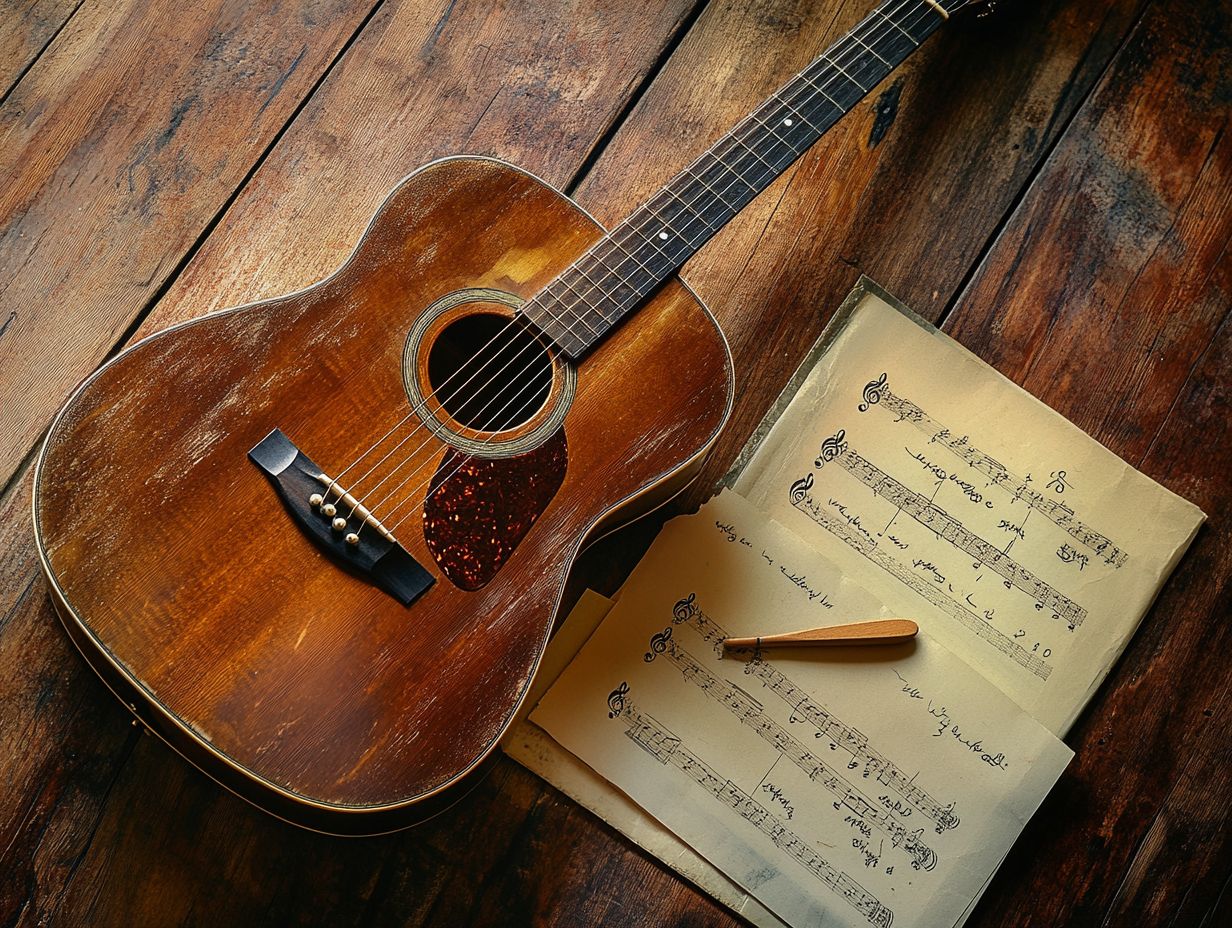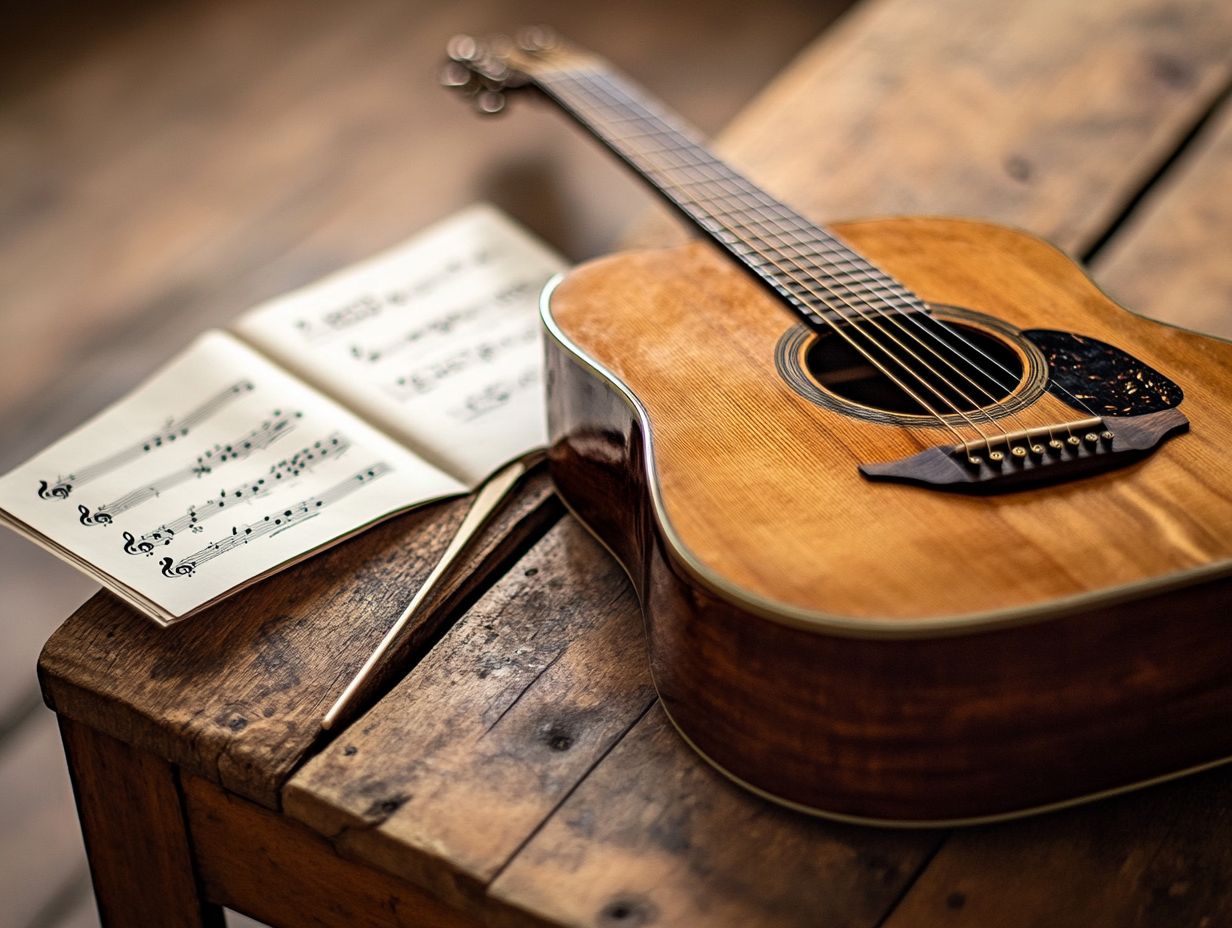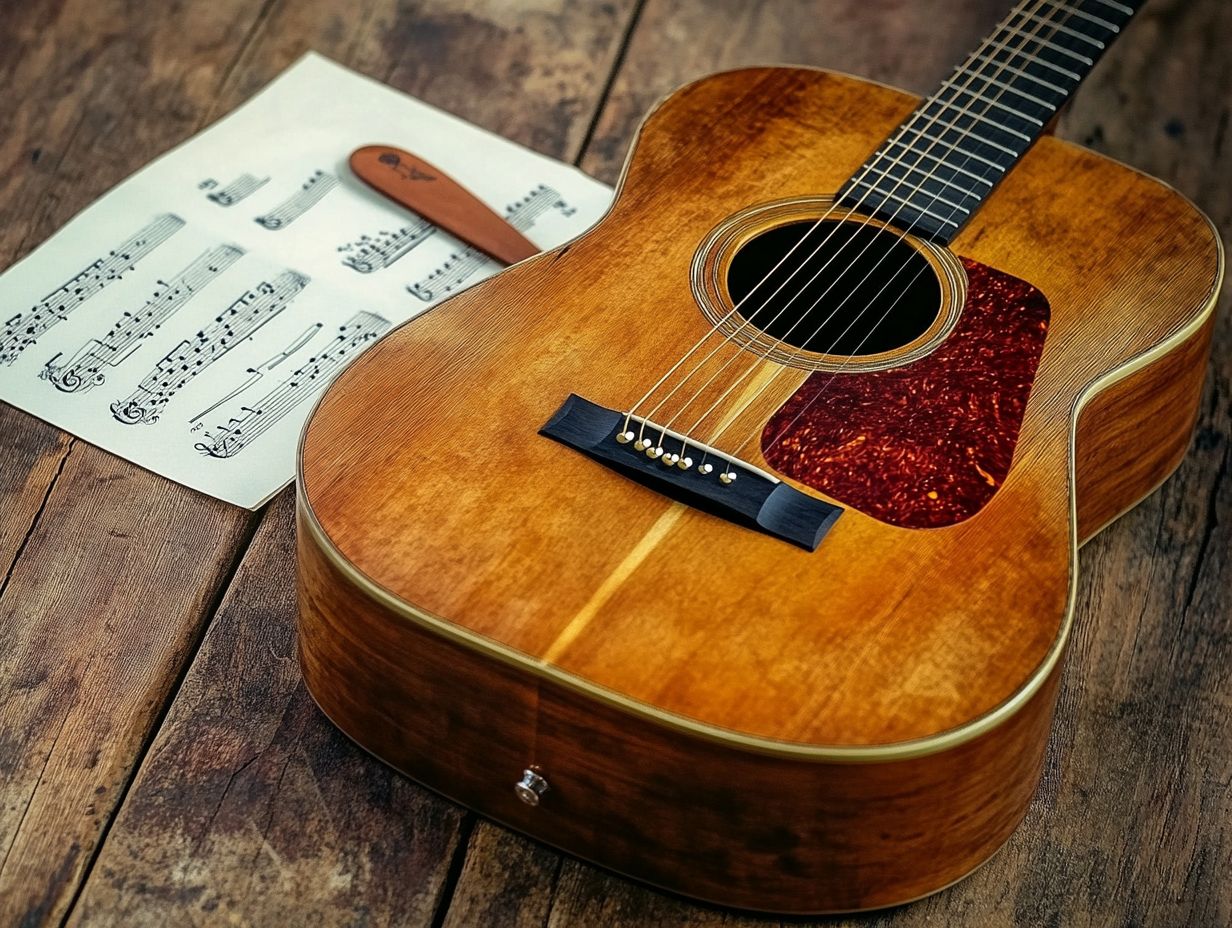Yamaha has established itself as a respected name in the world of musical instruments, especially in the realm of guitars, including their well-known Yamaha FG and Yamaha Pacifica models. This article delves into the brand’s rich history while assessing the quality of Yamaha guitars in terms of materials, craftsmanship, sound, and playability, as well as their overall value and customer satisfaction. It also compares various types of guitars, ranging from acoustic to electric models, including Yamaha’s bass guitars, to cater to all levels from beginners to advanced players. Additionally, the article explores pricing and customer reviews, revealing what makes Yamaha guitars a preferred choice among musicians, supported by their reputation for durability and value in comparison to brands like Fender, Gibson, and Ibanez.
Overview of the Brand and its History

Yamaha has long been synonymous with excellence in the realm of musical instruments, particularly in the guitar segment, where it has built a storied reputation for quality, craftsmanship, and sound. Founded in 1887, Yamaha began its journey as a manufacturer of pianos and reed organs, gradually expanding into various musical domains, including acoustic, electric, and bass guitars.
The brand’s commitment to innovation and tradition has enabled it to produce a diverse range of models that cater to beginners, intermediate, and advanced players, ensuring top-tier performance, sound projection, and playability that resonates with musicians worldwide.
Over the decades, Yamaha has achieved significant milestones, such as the introduction of the FG series in the 1960s, which set a new standard for affordable acoustic guitars without sacrificing sound quality or craftsmanship details. Their focus on craftsmanship is evident in the meticulous handcrafting processes and the selection of premium materials, including specific wood types and strings, earning the brand accolades from both musicians and critics alike.
Innovations like TransAcoustic technology underscore Yamaha’s dedication to enhancing the playing experience, allowing musicians to explore new sounds and effects in ways previously unimaginable. This forward-thinking approach has solidified Yamaha’s position as a key player in the guitar market, continually influencing the styles and preferences of guitarists around the globe, supported by artist endorsements and a diverse product lineup.
The Quality of Yamaha Guitars
Yamaha guitars are renowned for their exceptional craftsmanship, high-quality materials, and versatile sound characteristics. They are among the most widely used guitars across various musical genres, from rock to classical, attesting to their versatility and broad appeal.
Each Yamaha guitar model is meticulously designed with specific emphasis on performance metrics, sound clarity, tonal range, and features that enhance playability and comfort. Yamaha guarantees that its entire lineup of acoustic and electric guitars meets the highest industry standards for quality.
The company’s dedication to excellence is evident in their diverse range of products, which caters to beginners, intermediate, and advanced players alike, offering models with different specifications and performance levels.
Materials and Craftsmanship
The materials, craftsmanship, and innovative design of Yamaha guitars significantly contribute to their tonal quality and durability, distinguishing them in the competitive musical instrument market.
By carefully selecting premium woods such as solid spruce, mahogany, and rosewood, along with quality hardware and electronics, Yamaha ensures that each guitar not only produces a rich and vibrant sound but also withstands the test of time.
The choice of strings—whether coated for longevity or made from phosphor bronze for added warmth—further enhances the instrument’s character, while the setup and maintenance ensure optimal performance. Additionally, the durable finishes protect the guitar from wear and tear, providing an aesthetic appeal that musicians appreciate and supporting a higher resale value in the market.
With such meticulous attention to detail, superior construction, and robust warranty and support, it’s no surprise that Yamaha guitars continue to resonate with players seeking both reliability and exceptional sound.
Sound and Playability
Yamaha guitars are renowned for their exceptional sound, playability, and ergonomic design, making them suitable for musicians of all skill levels, from beginners to seasoned professionals, and offering user-friendly experiences. The unique combination of materials and craftsmanship enhances not only the tonal range, resonance, and sustain but also the overall user experience, making Yamaha a preferred choice in the music community.
Musicians consistently report high levels of performance across various Yamaha guitar models, each offering features tailored to different playing styles, music genres, and individual preferences. The clarity and warmth of the sound enable musicians to express themselves musically at a profound level, whether strumming chords or executing intricate fingerpicking patterns, with excellent intonation and feedback control.
Yamaha’s emphasis on ergonomic design is frequently highlighted in reviews from professional guitarists, ensuring that their instruments are comfortable to hold and easy to play, even during long practice sessions. The balanced tonal spectrum produced by Yamaha guitars accommodates various playing techniques and adapts well to a wide range of musical styles, including rock, blues, folk, and classical, enhancing their brand perception worldwide.
This versatility has made Yamaha a favorite among both recording artists and live performers who value its blend of affordability, quality, reliability, and strong dealer network in their musical pursuits.
Types of Yamaha Guitars

Yamaha offers a diverse range of guitar types, including acoustic, electric, and bass models, to cater to the varied musical tastes and skill levels of its customers, ensuring a comprehensive product range.
Each guitar is designed with features that enhance playability, sound quality, and comfort, providing an ideal setup for musicians. Therefore, selecting the right model is essential to meet the learning or performance needs of musicians, whether they are focused on practice, professional performances, or specific musical genres.
Acoustic vs Electric
Yamaha acoustic and electric guitars showcase distinct sound characteristics, playability assessment, and playstyles, making it essential to understand their differences when comparing the two types for specific music genres. Acoustic guitars deliver natural resonance and sound projection, while electric guitars provide versatility, amplification options, and adjustments like intonation, allowing them to be played across a broader range of genres. Yamaha’s engineering ensures that both guitar types produce high-quality sound, excellent tone, and durability, making them suitable for any player.
Acoustic models offer a warm, full-bodied tone, sustain, and resonance that resonates beautifully, making them ideal for strumming and fingerpicking, especially in smaller settings or intimate performances. In contrast, electric guitars present a much wider array of tonal possibilities and sound characteristics due to effects pedals, amplifiers, and advanced electronics, allowing for a dynamic range that can elevate a simple strum or note sequence into a powerful solo.
While both types of guitars can be highly expressive, they require different techniques: acoustic guitars often encourage a more melodic approach, whereas electric guitars tend to foster a more experimental style, allowing players to explore diverse playing techniques.
Ultimately, both guitars provide unique user experiences that enrich a musician’s creative expression, highlighting their similarities, differences, and adaptability to individual playing styles.
Beginner vs Professional
Yamaha offers a wide range of guitar models designed specifically for beginner, intermediate, and professional players, ensuring that every musician can find an instrument that meets their needs and supports their learning curve.
For beginners, models such as the FG series typically utilize synthetic materials and simpler construction techniques, which help keep the price affordable and the instruments user-friendly. The sound quality is sufficiently good to encourage practice, learning support, and skill development.
In contrast, Yamaha’s professional models, like the LL series, are crafted from premium tonewoods, feature intricate craftsmanship, advanced electronics, and tailored specifications for superior performance. These guitars are engineered to deliver richer tones, more dynamic ranges, and excellent build quality, making them ideal for live performances or studio recordings.
This distinction in quality and pricing reflects Yamaha’s commitment to providing a range of experiences for players of all levels, allowing musicians to upgrade their instruments as they refine their skills and invest in their musical journey.
Pricing of Yamaha Guitars
Yamaha guitar pricing strikes a balance between affordability, value, and high performance, enabling musicians of all budgets to find a quality instrument and assess the best investment for their needs. The company offers a wide range of price points, from entry-level beginner models to premium options for professional players, ensuring availability and broad market presence.
This diversity reflects Yamaha’s commitment to meeting the budgetary needs of different musicians while upholding the brand’s renowned quality in craftsmanship, sound, and customer satisfaction. Yamaha’s strategic positioning in the market further solidifies its reputation as a reliable choice for both novice and experienced musicians, supported by its comprehensive dealer network and consistent customer reviews.
Affordability and Value for Money

Yamaha guitars are renowned for their affordability, overall value, and competitive edge in comparison to brands like Ibanez and Cort, making them a popular choice among both beginner and professional musicians. The company is committed to providing quality instruments across various price ranges, ensuring that players can find reliable options at accessible prices, with excellent resale market and second-hand value.
Yamaha’s emphasis on durability, performance, and comprehensive specifications within its pricing structure enhances its reputation as a trusted name in the musical instruments industry. This pricing strategy not only meets customer expectations for affordable options but also boosts customer satisfaction and brand loyalty, as players typically enjoy sound and craftsmanship comparable to higher-end models.
As a result, brand loyalty is cultivated, with customers feeling confident in recommending Yamaha to other musicians, supported by online forums and community endorsements. The balance between affordability and quality showcases Yamaha’s marketing expertise and further solidifies the brand’s reputation as a go-to choice for anyone seeking genuine value for their money, investment, and longevity in their musical pursuits.
Customer Reviews and Ratings
Customer reviews and ratings serve as a vital source of information regarding the reputation of Yamaha guitars, offering insights into the real-life experiences and feedback of users that highlight the brand’s quality and performance.
Many users praise the exceptional sound, build quality, playability, and design of various Yamaha guitar models. Their feedback underscores Yamaha’s commitment to crafting instruments that cater to the needs of both beginner and professional musicians, with a focus on features, neck profile, fretboard, and action for optimal performance.
Additionally, comparisons with other guitar brands such as Fender, Gibson, and Cort provide further context to the overall perception of Yamaha’s standing and specifications comparison in the competitive guitar market.
Real-life Experiences with Yamaha Guitars: User Feedback and Artist Endorsements
Real-life experiences with Yamaha guitars highlight the satisfaction and reliability that musicians find in their instruments, making them a popular choice among players across different music genres. The brand’s positive reputation is often reported in customer reviews and online forums.
Customers frequently praise the brand for its consistent performance, sound clarity, and aesthetic appeal across various models, including acoustic and electric guitars, whether playing at home, during practice sessions, or on stage. This feedback not only underscores the quality of Yamaha guitars but also reflects the strong brand loyalty and customer satisfaction that the company has cultivated over the years.
Many artists have shared stories of how their Yamaha guitars have excelled during pivotal moments in their careers, from nailing the perfect solo at a local gig to enjoying jam sessions with friends. These artist endorsements highlight the guitar’s impressive sound projection and sustain, appealing to both beginner and advanced players.
A budding musician noted that the tonal richness and responsiveness of their Yamaha guitar, particularly in models like the Yamaha FG, significantly boosted their confidence, allowing them to explore different styles. Even seasoned professionals often highlight the ease of playability, durability, and exceptional craftsmanship of these instruments, reinforcing the notion that Yamaha not only meets but frequently exceeds the expectations of its users, further solidifying its reputation in the music industry.
Final Verdict on Yamaha Guitars
Yamaha guitars are renowned for their high quality, affordability, and versatility, appealing to a wide range of players and musical genres. The brand offers impressive value and an extensive product range, from beginner models to advanced guitars designed for serious musicians.
They have established themselves as a trusted brand in the musical instrument industry, reflecting Yamaha’s commitment to innovation, market presence, and the development of diverse models, each designed with unique features and specifications to meet the needs of various musicians, including bass and electric guitars.
While alternatives from competitors like Fender, Gibson, Ibanez, and Cort are available, Yamaha’s dedication to sound quality and user experience solidifies its position as a leading brand for both beginners and professionals. The brand’s reputation history and commitment to user-friendly instruments make it a staple in the music community.
Pros and Cons of the Brand

Pros and Cons of Yamaha Guitars: A Review
Yamaha guitars are renowned for their high-quality craftsmanship and reliability, which are consistent advantages of the brand. The following pros and cons provide a helpful summary of the benefits and drawbacks that consumers should consider when making a purchasing decision.
Pros of Yamaha Guitars:
- Exceptional quality craftsmanship and build quality
- Reliable durability and longevity
- A wide range of affordable pricing options and impressive value
- Versatile product lineup catering to different performance levels
- Good resale value and strong dealer network support
Cons of Yamaha Guitars:
- Some specific models may have drawbacks, such as weight or limited features.
For instance, Yamaha’s entry-level acoustic guitars, like the Yamaha FG800 and Yamaha F325D, are typically priced under $300. These models consistently receive high praise for their sound quality and playability, making them a popular choice for many beginner guitarists.
While Yamaha guitars are known for their reliability and consistency, some advanced players have noted that they often lack the tonal nuances and complexities sought by professionals. Additionally, feedback from users indicates that several electric models, such as those in the Yamaha Pacifica series, can be heavier than expected, potentially impacting comfort during extended play. This has led to comparisons with other brands in terms of weight and specifications, such as neck profile and fingerboard design.



